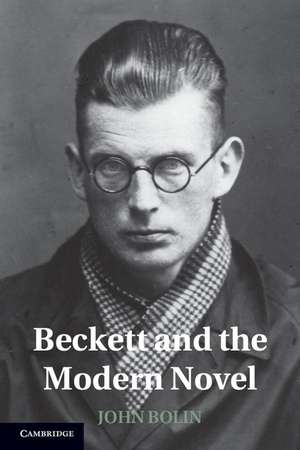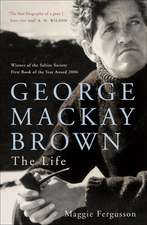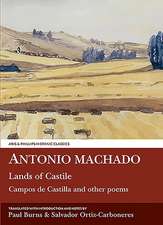Beckett and the Modern Novel
Autor John Bolinen Limba Engleză Hardback – 21 oct 2012
Preț: 691.66 lei
Preț vechi: 777.15 lei
-11% Nou
Puncte Express: 1037
Preț estimativ în valută:
132.35€ • 138.53$ • 110.16£
132.35€ • 138.53$ • 110.16£
Carte tipărită la comandă
Livrare economică 31 martie-14 aprilie
Preluare comenzi: 021 569.72.76
Specificații
ISBN-13: 9781107029842
ISBN-10: 1107029848
Pagini: 228
Ilustrații: black & white illustrations
Dimensiuni: 152 x 229 x 17 mm
Greutate: 0.45 kg
Ediția:New.
Editura: Cambridge University Press
Colecția Cambridge University Press
Locul publicării:New York, United States
ISBN-10: 1107029848
Pagini: 228
Ilustrații: black & white illustrations
Dimensiuni: 152 x 229 x 17 mm
Greutate: 0.45 kg
Ediția:New.
Editura: Cambridge University Press
Colecția Cambridge University Press
Locul publicării:New York, United States
Cuprins
Introduction; 1. 'The integrity of incoherence': theory and Dream of Fair to Middling Women; 2. 'An ironical radiance': Murphy and the modern novel; 3. 'The creative consciousness': the Watt notebooks; 4. 'Telling the tale': narrators and narration (1943–6); 5. Images of the author; 6. 'Oh it's only a diary': Molloy; 7. 'The art of incarceration': Malone Dies; Conclusion: Beckett and the modern novel; Bibliography.
Recenzii
'Powerfully argued, the book is a timely reminder that Beckett was first and foremost a man of 'arts' and only secondly one of 'letters'.' The Times Higher Education Supplement
'Bolin elaborates fascinating connections that demonstrate the breadth of his archival research: he shows, for example, how Beckett's lectures on Gide in 1930, which emphasize … Gide's anti-realist stance, resistance to narrative closure, experiments with mise-en-abyme structures, and interest in self-reflexivity, profoundly shaped Beckett's own narrative practices and his writing of Dream of Fair to Middling Women, Murphy, Watt, and the Trilogy … his chapter on La Nausée as a source text for Molloy in their similar critique of the diary form as 'a master-narrative of self-discovery and salvation' is particularly sharp …' French Studies
'Bolin's book provides invaluable reading for anyone interested in Beckett's formative influences or his complex relationship with modernism.' Adam Winstanley, Modernism/modernity
'The strength of Bolin's book lies within its focus on Beckett as a writer, struggling with his material, struggling with his own tendency toward erudition and the 'loutishness of learning', and, ultimately, struggling with the coherence and structures of control of the novel form itself.' Paul Stewart, Journal of Beckett Studies
'Bolin elaborates fascinating connections that demonstrate the breadth of his archival research: he shows, for example, how Beckett's lectures on Gide in 1930, which emphasize … Gide's anti-realist stance, resistance to narrative closure, experiments with mise-en-abyme structures, and interest in self-reflexivity, profoundly shaped Beckett's own narrative practices and his writing of Dream of Fair to Middling Women, Murphy, Watt, and the Trilogy … his chapter on La Nausée as a source text for Molloy in their similar critique of the diary form as 'a master-narrative of self-discovery and salvation' is particularly sharp …' French Studies
'Bolin's book provides invaluable reading for anyone interested in Beckett's formative influences or his complex relationship with modernism.' Adam Winstanley, Modernism/modernity
'The strength of Bolin's book lies within its focus on Beckett as a writer, struggling with his material, struggling with his own tendency toward erudition and the 'loutishness of learning', and, ultimately, struggling with the coherence and structures of control of the novel form itself.' Paul Stewart, Journal of Beckett Studies
Notă biografică
Descriere
John Bolin challenges the notion that Beckett's fiction is best understood through philosophical or Anglo-Irish literary contexts.
















